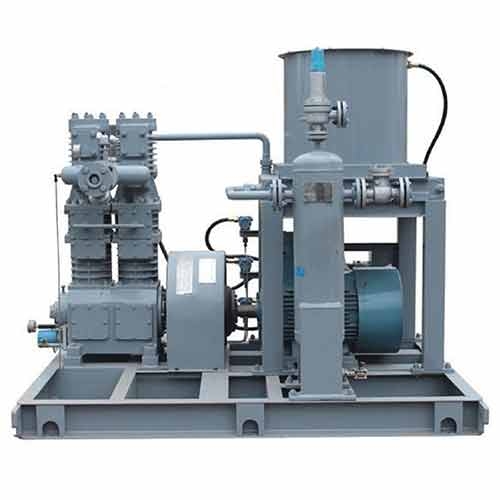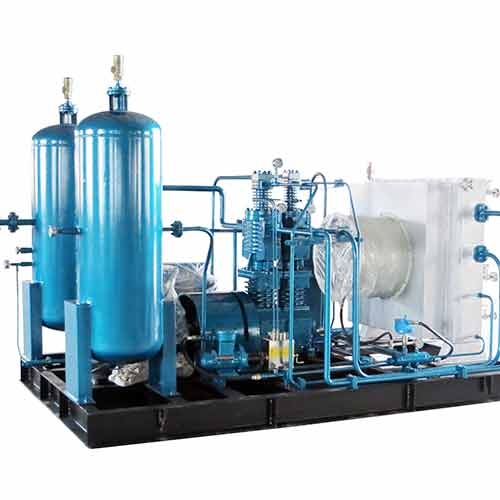What is an H2 compressor and its benefits?
Brief introduction of H2 compressor
A specialized mechanical device called an H2 compressor, often called a hydrogen compressor, is used to raise the pressure of gaseous hydrogen. This technology is crucial to many industrial and energy applications, particularly in hydrogen synthesis, storage, and transportation. H2 compressor is used to increase the pressure of hydrogen gas produced using various processes, such as electrolysis or steam methane reforming. This pressurized hydrogen may then be effectively transferred through pipes or stored in tanks, making it available for various uses, such as fuel cell automobiles and industrial activities.
They play a crucial role in the developing hydrogen economy, where hydrogen is being investigated as a clean and sustainable energy carrier. They increase hydrogen’s viability as a substitute for fossil fuels by ensuring it can be supplied and transported safely at the required pressures. These compressors are available in various designs, including piston, diaphragm, and rotary screw compressors, each suited to certain operating needs. These compressors will continue to be crucial in supporting the broad use of hydrogen as a renewable and clean energy source as the globe moves towards greener energy alternatives.
Types of H2 compressor:
It’s crucial to be aware that there are several types of H2 compressor, including reciprocating, centrifugal, and diaphragm compressors, each having unique benefits and working principles. For instance, centrifugal compressors rely on the kinetic energy of a revolving impeller, whereas reciprocating compressors employ a piston-cylinder configuration. Diaphragm compressors use flexible diaphragms to achieve compression. The needed pressure range, flow rate, and the particular application are all important considerations when selecting a compressor type.

What elements must be considered while developing an H2 compressor?
To assure safe and effective operation, designing a hydrogen compressor is a challenging undertaking that requires careful consideration of several elements. Since hydrogen is a special gas that differs from other gases in several ways, consideration must be given to these characteristics while designing the compressor. In this blog article, we’ll examine the crucial elements that engineers and designers must consider when developing this compressor.
- Hydrogen Purity:
Hydrogen must adhere to strict purity standards for various applications. The compressor’s design should prevent impurities from entering the hydrogen stream. To avoid contamination, considerable consideration must be given to the materials utilized, the sealing mechanisms, and the lubricating systems.
- Material Compatibility:
Hydrogen has a high degree of reactivity with some materials, which might result in embrittlement or leaks. To preserve the compressor’s long-term integrity, designers must choose materials compatible with hydrogen, such as stainless steel or specialized alloys.
- Pressure and Flow Rate:
The compressor’s design must adhere to the application’s pressure and flow rate requirements. To accomplish the specified compression ratios, the right compressor type must be chosen (for example, a reciprocating, centrifugal, or diaphragm compressor).
- Safety:
Safety is of the utmost importance when handling hydrogen, which is combustible and can produce explosive air mixes. To reduce possible risks, designers must include safety elements like leak detection systems, explosion-proof enclosures, and pressure relief valves.
- Cooling:
Hydrogen compression produces heat. Therefore, keeping the compressor running smoothly and from overheating is important. The design should include suitable cooling components, including heat exchangers or water jackets.
Designing an H2 compressor requires in-depth knowledge of hydrogen characteristics, safety procedures, energy efficiency, and environmental concerns. To develop a dependable and effective compressor system that aids in developing hydrogen technology and the shift to greener energy sources, engineers and designers must carefully consider these issues.

How does the H2 compressor work?
It is a mechanical tool used to raise the pressure of hydrogen gas. The storage, delivery, and generation of hydrogen all depend on its proper operation. Understanding the fundamental tenets of gas compression is necessary to comprehend how this compressor operates.
- Intake of low-pressure hydrogen gas from a source, such as a hydrogen production plant or storage tank, initiates the process. Through an input or suction port, this low-pressure gas enters the compressor.
- The heart of the compressor, the compression chamber, is where the low-pressure hydrogen gas enters. Depending on the design of the compressor, the chamber often comprises a piston or a diaphragm.
- The volume of the hydrogen gas decreases as the compression chamber spins or compresses. Because of the gas molecules’ increased proximity due to the volume reduction, pressure rises. Until the gas reaches the desired pressure, the compressor cycles continuously, compressing it.
- The hydrogen gas is released from the compressor through a discharge port once compressed to the correct pressure. The high-pressure hydrogen gas is now prepared for use in various ways, including refuelling fuel cell cars and putting fuel in storage tanks for later use.
- Due to the effort done on it during compression, hydrogen may produce heat. Cooling systems, such as water jackets or heat exchangers, are frequently incorporated into the compressor’s design to prevent overheating and guarantee the compressor’s effectiveness. Additionally, lubrication systems are necessary to lessen wear and friction on the moving elements of the compressor.
- Since hydrogen is a dangerous gas, the H2 compressor must include safety features. These elements include leak detection systems, pressure relief valves, and explosion-proof enclosures to reduce possible risks and guarantee safe operation.
- They have sophisticated control systems in place to keep an eye on and manage the compression process. These systems maximize the compressor’s effectiveness by responding to fluctuations in demand and assisting in maintaining the optimum pressure.
Conclusion:
Many businesses depend on H2 compressor because they supply the appropriate pressure for safely transporting and storing hydrogen gas. These compressors are created specifically to handle the peculiar characteristics of hydrogen while ensuring efficient and secure operation. Every customer can depend on HUAYAN to provide them with comprehensive one-stop solutions everywhere in the world, as well as high-quality products and amiable service. Our skilled technical technical design, performance calculation, machining, welding, assembly, testing, and other manufacturing and processing abilities make high-quality gas compressors possible. Additionally, our business has access to many of the most cutting-edge processing tools available.
